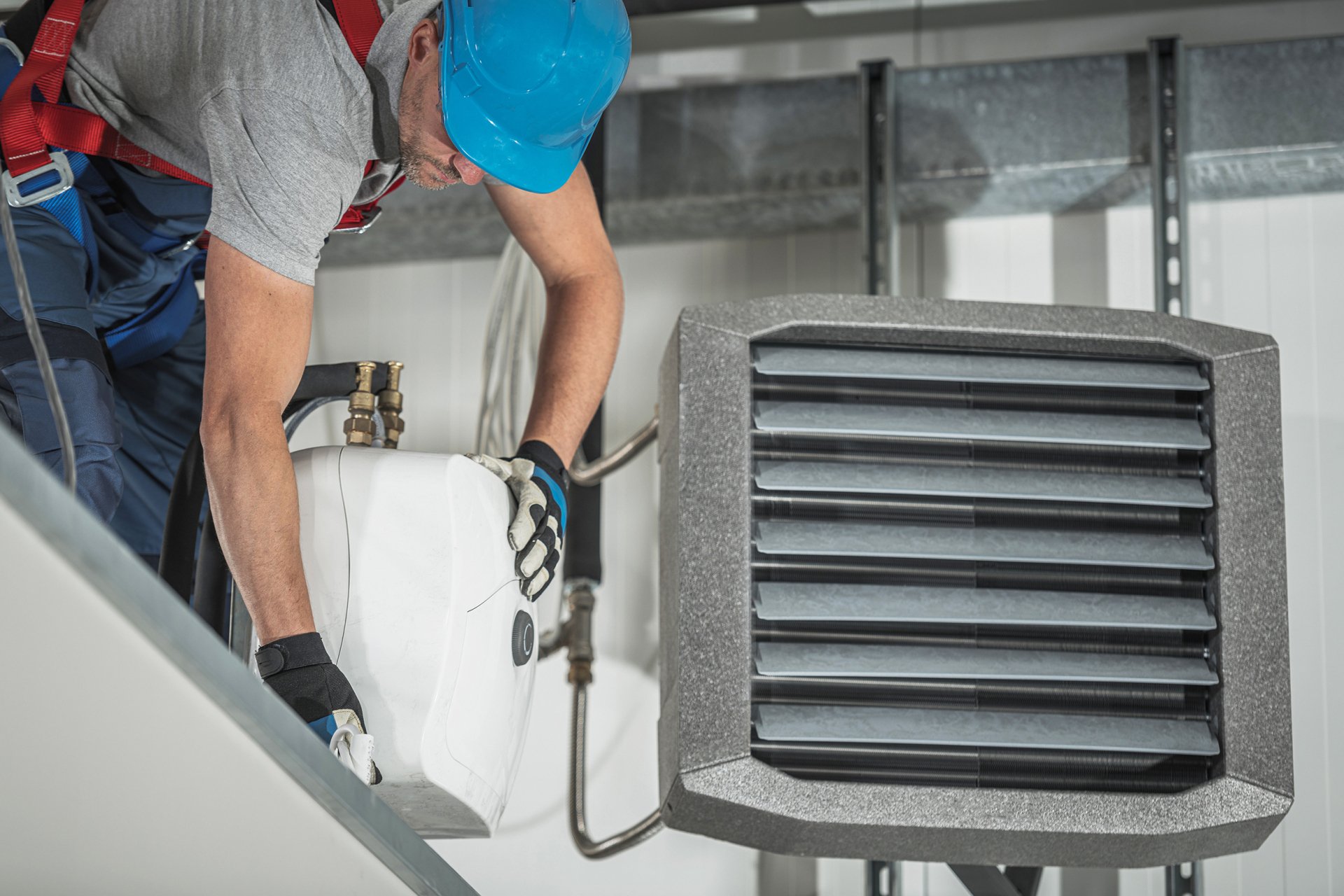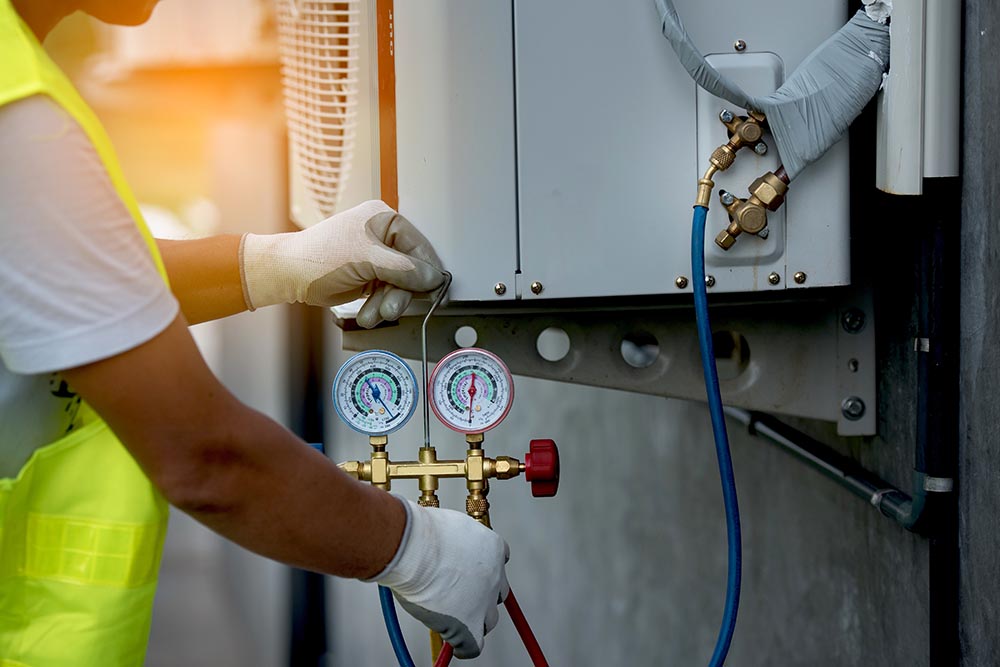5 Must-Know Facts About ductless mini splits Before You Upgrade
5 Must-Know Facts About ductless mini splits Before You Upgrade
Blog Article
Picking Between a Heatpump and Furnace: Key Considerations for Your Heating And Cooling Needs
When assessing home heating choices for HVAC needs, the decision in between a heatpump and a heating system can be complex. Each system supplies distinctive advantages customized to particular environments and power efficiency objectives. Comprehending these differences is crucial for making an educated option. Key factors such as installment expenses and ecological influence further make complex the selection procedure. Which choice truly aligns with one's comfort and sustainability choices? The complying with sections will certainly explore these factors to consider in detail.
Recognizing Warm Pumps: Just How They Work and Their Advantages
While lots of home owners consider numerous heating choices, recognizing how warmth pumps feature and their benefits can considerably influence their decision. Heatpump run by transferring warm as opposed to generating it. In the winter, they remove heat from the outdoors air or ground and move it inside your home, while in the summertime, they reverse this procedure, cooling down the home by eliminating warm outside. This dual performance makes them versatile for year-round environment control.One of the primary advantages of warm pumps is their energy performance. They use considerably much less electricity contrasted to traditional heating unit, potentially causing lower utility bills (heat pump installation ooltewah tn). In addition, heat pumps have a smaller carbon footprint, making them an eco-friendly selection. They additionally require much less upkeep than conventional systems, adding to lasting price financial savings. In general, understanding the auto mechanics and advantages of heatpump can assist home owners make notified choices regarding their home heating and cooling requirements
Checking Out Heaters: Types, Operation, and Advantages
Furnaces can be found in different types, including gas, electric, and oil versions, each with distinctive functional devices. Understanding these differences is important, as they influence effectiveness and heating efficiency. Additionally, heaters use numerous benefits, such as constant warm output and reliability in chillier environments.
Types of Heating systems
Heating unit can vary substantially in style and operation, with heaters being a preferred option among house owners. There are several kinds of heating systems, each making use of different fuel sources and innovations. Gas heaters are typical, leveraging natural gas to generate warm successfully. Electric furnaces, on the various other hand, make use of electric resistance to generate heat, frequently preferred for their uncomplicated installation. Oil heating systems, while less typical, work in locations with limited gas accessibility (heat pump installation ooltewah tn). Furthermore, condensing heating systems make best use of energy efficiency by recycling and capturing exhaust gases. Each type runs through a system of heat exchangers and ductwork to disperse warm air throughout a home. Recognizing the differences in between these furnace kinds is essential for informed heating and cooling decisions
Benefits of Heating systems
For property owners seeking dependable heat throughout cool months, the advantages of heating systems are considerable. Heating systems supply constant heating, making sure even temperatures throughout the home. They are specifically reliable in severe chilly, usually exceeding heatpump in icy problems. Different types, including gas, electrical, and oil heaters, offer flexibility to satisfy varied requirements and preferences.Furnaces additionally often tend to have reduced first installation prices compared to heatpump, making them a more easily accessible alternative for several. Their robust style adds to a much longer life-span, with many units lasting over 15 years with proper maintenance. Additionally, modern furnaces are commonly outfitted with sophisticated innovation for enhanced effectiveness, which can result in decreased energy bills. Overall, furnaces remain a dependable choice for reliable home heating.

Power Efficiency: Comparing Heat Pumps and Furnaces
When contrasting power performance in between heatpump and heating systems, the Seasonal Energy Efficiency Ratio (SEER) plays an important function in identifying performance. In addition, a functional expense analysis reveals the long-term economic effects of each system. Recognizing these factors can lead house owners in making notified choices concerning their home heating services.
Seasonal Energy Effectiveness Ratio
Energy performance plays a crucial function in the decision-making process in between heatpump and furnaces, specifically when taking into consideration the Seasonal Energy Performance Ratio (SEER) This metric measures the cooling efficiency of heat pumps over an entire cooling period, giving a standardized means to review efficiency. Greater SEER scores indicate greater power performance, converting to reduced power usage and minimized utility bills. In comparison, furnaces are generally evaluated using the Yearly Gas Use Effectiveness (AFUE) score, which mirrors home heating performance. When contrasting these 2 systems, property owners ought to focus on SEER ratings for warm pumps, as they directly impact general energy cost savings and environmental sustainability. A thorough understanding of SEER can especially influence the lasting contentment and cost-effectiveness of the picked HVAC remedy.
Operational Expense Evaluation
Understanding the functional prices connected with heatpump and heating systems is important for homeowners examining their choices. Heatpump normally offer greater power effectiveness, converting electrical energy right into heat with marginal waste. This results in reduced monthly utility costs, especially in modest climates. On the other hand, standard heaters, specifically gas models, might have lower ahead of time costs but can sustain greater operational costs over time because of sustain prices and effectiveness ratings.Moreover, heatpump can work as both home heating and cooling down systems, potentially minimizing the demand for separate cooling and heating units. While preliminary financial investments for heat pumps may be higher, their long-lasting savings in power performance can make them an extra cost-efficient option for several households. Careful analysis of regional power prices is important to figure out the most effective option.
Installation Expenses: What to Expect for every Furnace
Installment prices for heater can differ substantially in between heat pumps and furnaces, influencing house owners' choices. Heatpump generally have higher upfront installation costs, generally ranging from $3,500 to $8,000, depending upon the unit size and intricacy of installment. This consists of the outside system, indoor handling system, and required ductwork modifications. Conversely, furnaces tend to have reduced first expenses, sites averaging between $2,500 and $6,000, which can be appealing for budget-conscious property owners. Nevertheless, installation expenses can enhance if considerable ductwork is required.Moreover, the selection of gas type for furnaces-- all-natural gas, lp, or electric-- can additionally affect setup costs. While heat pumps provide energy effectiveness, their first investment may hinder some customers. Eventually, examining installation costs together with long-lasting financial savings and performance will certainly aid homeowners in making notified decisions regarding their furnace.
Environment Considerations: Which System Executes Better in Your Location
How do environment conditions influence the performance of heater? The efficiency of warmth pumps and heating systems can differ considerably depending on the regional environment. In moderate climates, heatpump succeed by efficiently moving warmth from the outside air, making them an energy-saving alternative. Their effectiveness lessens in extremely chilly temperature levels, where they might battle to extract sufficient warm. Conversely, heaters, especially gas designs, provide constant and dependable warm regardless of outside conditions, making them preferable in colder regions.In locations that experience milder winters, heatpump can operate successfully year-round, giving both cooling and heating. In contrast, regions with harsh winters months typically take advantage of the toughness of heaters. Eventually, comprehending the regional environment is important when determining in between a warm pump and a heater, as it directly impacts their functional effectiveness and general performance.
Upkeep Requirements: Long-Term Look After Warmth Pumps vs. Furnaces
While both warm pumps and heating systems require normal upkeep to ensure peak performance, their certain requirements and treatment regimens vary significantly. Heaters usually need much less constant interest, with annual examinations sufficing to look for gas leaks, clean filters, and assess total performance. Their simpler layout frequently enables uncomplicated repairs.In contrast, heatpump demand biannual maintenance as a result of their dual role in cooling and heating. This consists of cleaning coils, inspecting cooling agent levels, and ensuring that both the outside and interior units operate at their finest. Additionally, heatpump maintenance commonly entails more complex components, making specialist servicing essential.Neglecting upkeep can bring about decreased efficiency and boosted power costs for both systems. Inevitably, house owners need to consider these long-lasting care demands when picking in between a warmth pump and a furnace, as proactive upkeep can expand the life expectancy and efficiency of either system substantially.
Ecological Impact: Selecting a Sustainable Heating Choice
The environmental effect of furnace is an important assessment for homeowners seeking sustainable options. Heatpump are generally more energy-efficient than traditional furnaces, as they transfer heat instead of generate it, greatly decreasing carbon discharges. By using renewable resource sources, such as geothermal or air-source warmth pumps, home owners can better decrease their eco-friendly footprint.On the various other hand, gas heating systems release greenhouse gases and add to air pollution, though they often offer higher warmth result. Nevertheless, improvements in innovation have brought about the growth of high-efficiency heating systems that reduce emissions.Ultimately, selecting a heating unit entails evaluating efficiency versus ecological impact. Homeowners are urged to assess neighborhood energy resources and rewards for sustainable systems, ensuring an option that aligns with both individual comfort and ecological responsibility. The choice impacts not just immediate convenience but likewise long-term sustainability and environmental wellness.
Often Asked Inquiries
Exactly How Lengthy Do Heat Pumps and Furnaces Commonly Last?
The life expectancy of warmth pumps usually varies from 15 to 20 years, while heating systems can last in between 15 to 30 years. Routine upkeep considerably impacts their long life and efficiency in supplying home heating solutions.
Can I Utilize a Warmth Pump in Extremely Cold Climates?
Warm pumps can run in extremely cold climates, however their effectiveness diminishes as temperatures decrease. In such conditions, supplementary heating resources may be necessary to keep comfortable indoor temperatures and ensure peak performance.

What Is the Sound Level of Warmth Pumps Versus Furnaces?
The sound levels of heatpump and heating systems vary substantially. Normally, heatpump run more silently than standard furnaces, making them better for those conscious sound, while heating systems may generate louder operational sounds during home heating cycles.
Are Warm Pumps Suitable for Both Heating & Cooling?
Heatpump are undoubtedly suitable for both heating & cooling (ductless mini splits). They operate by transferring warm, providing effective temperature control year-round, making them a flexible selection for property owners looking for an all-in-one heating and cooling remedy
What Size Heating System Do I Required for My Home?
Determining the proper dimension heating system for a home needs reviewing elements such as square video, insulation quality, local environment, and the home's format. Consulting a professional can ensure a precise analysis and excellent comfort. Warmth pumps commonly provide greater power efficiency, converting electric energy into warm with marginal waste. In modest climates, heat pumps stand out by effectively moving warmth from the outdoors air, making them an energy-saving alternative. Conversely, furnaces, visit this website especially gas designs, supply trusted and consistent warm regardless of outside conditions, making them more effective in chillier regions.In areas that experience milder winter seasons, warm pumps can operate efficiently year-round, supplying both heating and cooling. Heat pumps are generally more energy-efficient than traditional furnaces, as they transfer warmth instead than create it, considerably minimizing carbon discharges. By using sustainable energy resources, such as air-source or geothermal warmth pumps, house owners can additionally minimize their environmental footprint.On the other hand, all-natural gas heaters discharge greenhouse gases and add to air pollution, though they check my blog often give greater warm output.
Report this page